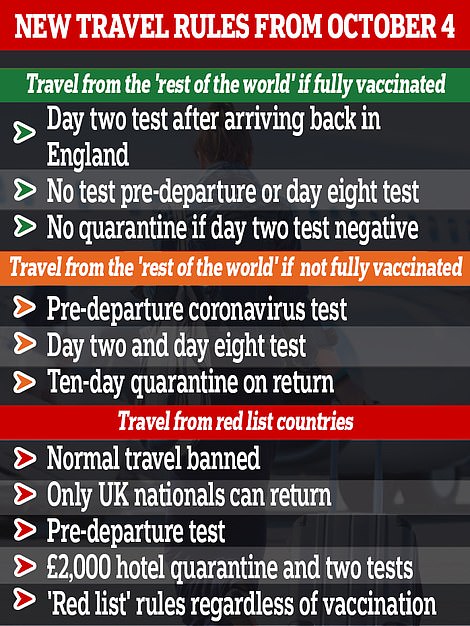
Holiday bookings soared yesterday after punitive travel restrictions were finally lifted.
Within minutes of the official announcement, travel agents were deluged with inquiries and predicted this weekend would be their busiest of the year.
Demand for October half-term trips was three times higher than in August as firms slashed prices.
Turkey and the Maldives, both removed from the red list yesterday, were among the most sought after destinations.
The traffic light system is also being replaced with a simpler ‘go/no-go’ regime with far less coronavirus testing.
The fully vaccinated will no longer have to pay for costly PCR swabs or pre-return tests.
Instead they will need to purchase only a cheaper lateral flow test within two days of returning, taking a free PCR swab if this is positive.
The shake-up means testing bills faced by families will be slashed by hundreds of pounds.
The only destinations that will remain off limits for the double jabbed are on the red list. All arrivals from these countries will still have to quarantine in hotels for 11 nights on arrival in England at a cost of £2,285, regardless of vaccination status.
The rule changes will apply to visiting foreigners jabbed with UK-recognised vaccines, meaning a boost to domestic businesses starved of tourist spending.
The new regime will be introduced in three steps, starting with eight countries being removed from the red list at 4am on Wednesday.
Pre-return tests will be scrapped for the double jabbed on October 4, when the new ‘go/no-go’ system will come into force.
The traffic light system will remain until then. Costly PCR swabs will then be ditched for the fully vaccinated towards the end of October.
The changes to the travel rules came as:
The vaccine booster programme got under way yesterday, with a maternity support worker among the first to receive the jab; Industry leaders warned that care homes will be forced to shut, break the law or drop standards if ministers fail to push back the deadline for compulsory jabs; Nicola Sturgeon has called in the British Army to deal with Scotland’s ambulance crisis after she was forced to apologise for life-threatening delays; A survey found that a majority of people believe workers will never return to the office full-time after the pandemic; The latest figures showed that Covid infections appear to be falling in all regions of England, even after children have returned to school. 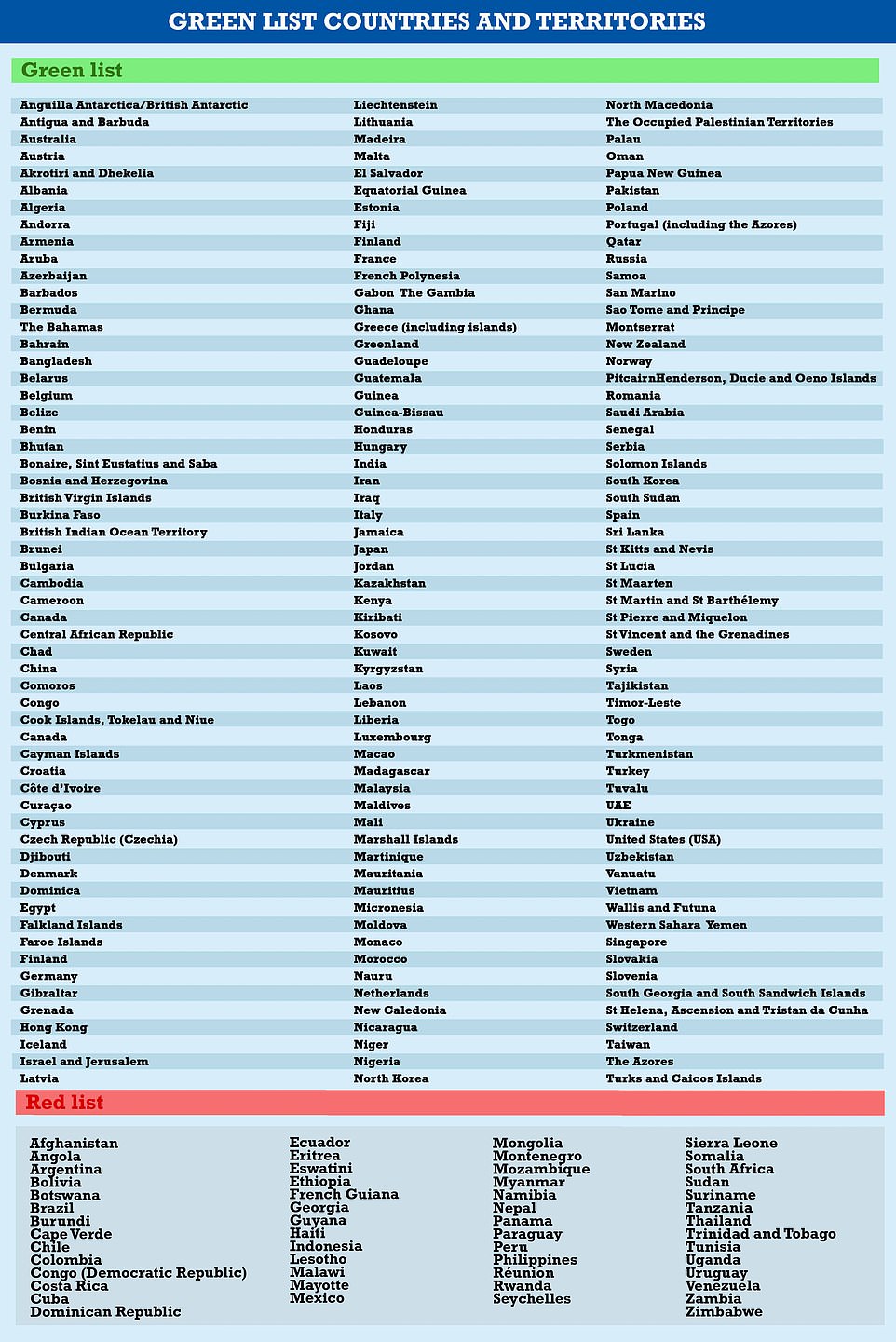
Ministers today announced they are replacing the current international travel traffic light scheme with a simplified ‘go and no-go’ system as they also scrapped pre-departure tests for fully-vaccinated travellers returning to England
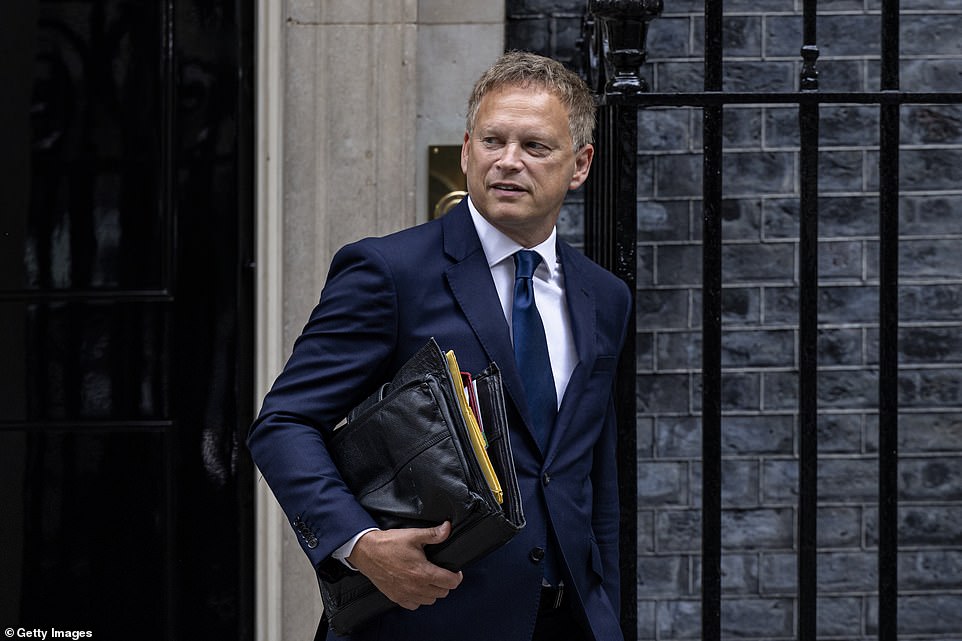
Transport Secretary Grant Shapps said that from October 4 the current approach of green, amber and red will be ditched in favour of a single red list of banned countries and a ‘rest of the world’ category for everywhere else.
What are the new travel rules from October 4 and how do they compare to the current traffic light system?
As of October 4, the Government’s travel traffic light system is being replaced with a simplified two-tier ‘go/no-go’ scheme.
There will be a ‘red list’ of banned countries and a ‘rest of the world’ list for everywhere else.
Travel to and from nations in the ‘rest of the world’ list will be easier but there will be different rules depending on vaccination status.
This is how the new system will work:
Travel from the ‘rest of the world’ if you are fully vaccinated
Travellers must book and pay for a day two coronavirus test to be taken after arriving back in England.
They do not need to take a pre-departure test before coming back to the country or take a day eight test. There is no quarantine requirement – assuming the day two test is negative.
Travel from the ‘rest of the world’ if you are not fully vaccinated
Travellers must take a pre-departure coronavirus test before coming back to England.
They must also book and pay for a day two and day eight test.
After arriving in England they must quarantine at home for 10 days.
Travel from red list countries
Normal travel from these countries remains banned and only UK nationals can return from them.
Travellers must take a pre-departure test. They must also book and pay for a Government-backed quarantine hotel package.
The stay in hotel quarantine will cost more than £2,000 and will involve two tests.
The ‘red list’ rules apply regardless of vaccination status.
WHAT IS CURRENTLY IN PLACE?
RED: Travel to the UK from a red list country is banned for non-UK nationals. Britons returning to the UK must take a pre-departure test and book a ten-day stay in hotel quarantine including tests at a cost of £1,750. Countries include Brazil, Turkey, Bangladesh and South Africa.
AMBER: A pre-departure test is required before heading to Britain while non-vaccinated people have to quarantine for ten days at home and book tests on day two and day 8. They can also pay for a day 5 test under the ‘test to release’ scheme. The fully-vaccinated do not have to isolate but they do have to book a day 2 test. Countries include Italy, Spain, Portugal and Greece.
GREEN WATCHLIST: This is a category for countries which are at risk of losing their green status (see below). Countries include Barbados, Croatia and Israel.
GREEN: Returning travellers must take a pre-departure test and book a day two test as well. Quarantine is not required for anyone unless the test is positive. Countries include Bulgaria, Canada , Iceland and Malta.
Advertisement
Ministers did not specify a date but said they were aiming to have this in place ‘for when people return from half-term breaks’.
Another crucial change means passengers who transit through a red-list destination, having been in a safe country, will not be subjected to hotel quarantine.
The unvaccinated face even tougher rules under the new regime in a bid by ministers to encourage more people to get jabbed.
Even when returning from countries on the ‘go’ list, they will have to isolate at home for ten days and take PCR tests on days two and eight.
They will still have the option of taking an extra post-arrival PCR test on the fifth day to be released from self-solation early.
MPs and the travel industry welcomed the shake-up, having warned for weeks that failure to overhaul the system could lead to thousands more job losses.
But some questioned why ministers were not scrapping PCR tests for the double jabbed for another month, and stepped up calls for all testing to be scrapped.
Alan French, chief executive of Thomas Cook, was among those reporting a bookings rush.
He said: ‘The news today is a shot in the arm for both the travel industry and families up and down the country who are crying out for some much-needed late summer sun. Based on our bookings already today, I would expect this weekend to be the biggest of the year so far.
‘Bookings for October half-term are up more than 200 per cent compared to August as people lock in great prices for beach breaks in their favourite Mediterranean sunspots.’
Package holiday giant Jet2.com also reported a bookings bonanza.
Chief executive Steve Heapy said: ‘There has been an immediate and massive surge in bookings for flights and package holidays on the back of this welcome news for holidaymakers in England.’
The carrier will resume flights to Turkey from Thursday next week.
Tim Alderslade, chief executive of Airlines UK, said: ‘By reducing the number of red-list destinations and scrapping PCR testing, ministers have paved the way for people to get away this October half-term and into the winter following 18 months of uncertainty.’
John Holland-Kaye, chief executive of Heathrow, added: ‘This simplification of the travel rules is very welcome for businesses and families across the country but the decision to require fully vaccinated passengers to take more costly private lateral flow tests is an unnecessary barrier to travel, which keeps the UK out of step with the rest of the EU.’
Travel firms were offering discounts of more than a third on holidays to traditional hotspots such as Spain, Greece and Portugal.
The shake-up will apply to England only, with Scotland last night saying it would not follow suit.
Holyrood said it had ‘concerns at the impact on public health’ of the changes and would not be adopting them. Wales and Northern Ireland have not yet said whether they will fall in line.
In a further boost for families, the new regime will carry over the current rules on children. It means under-18s will be treated as though they are fully jabbed, even if they are not.
However, returning holidaymakers will still be required to fill in a passenger locator form before travelling back to England.
They will need to prove they have ordered a day two lateral flow test and input their order number into the form. Free NHS lateral flow tests will not be available.
Announcing the move last night, Transport Secretary Grant Shapps said: ‘Today’s changes mean a simpler, more straightforward system.’

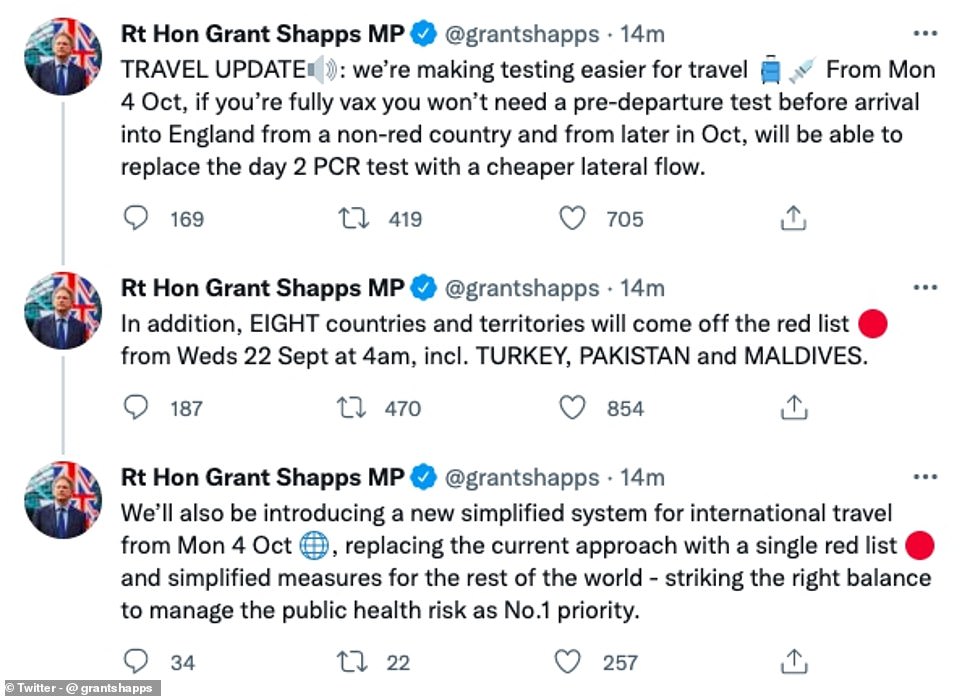
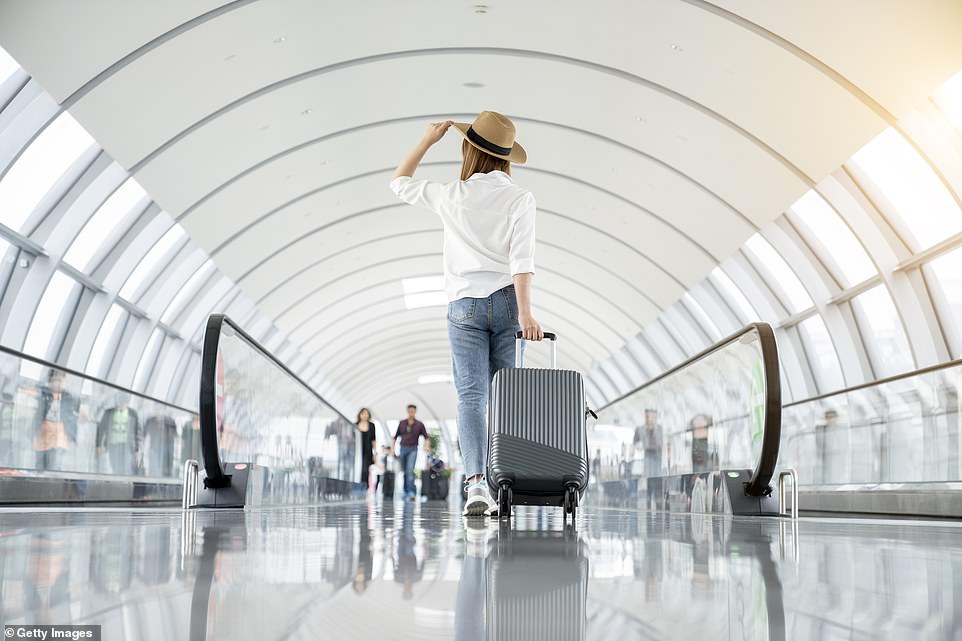
Hated travel testing rules are to be torn up for the fully jabbed in time for the half-term holidays – but unvaccinated Britons will still have to quarantine on their return. Library image
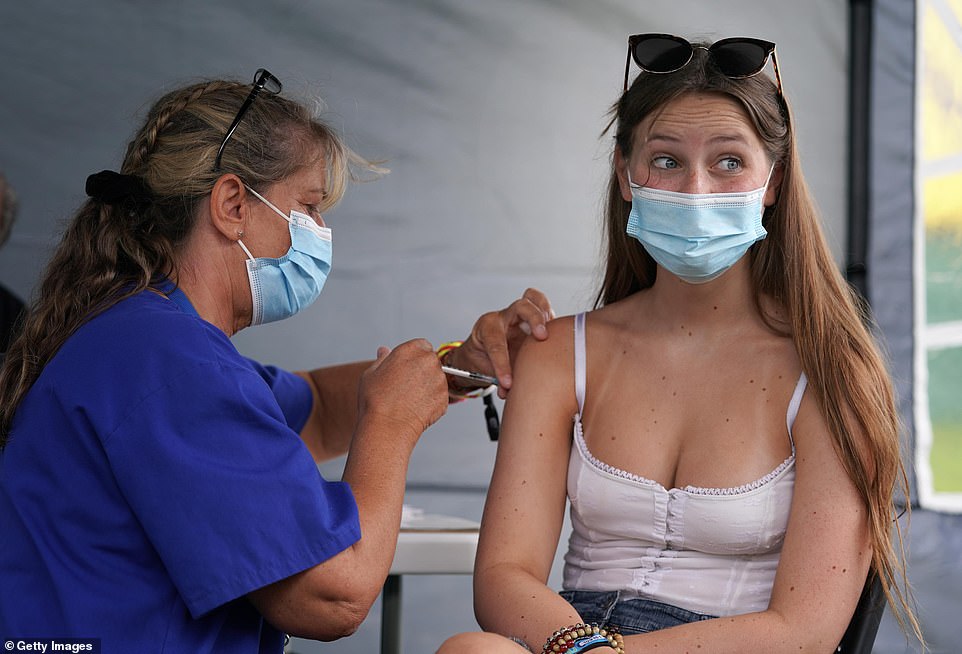
Those who are unvaccinated face even tougher restrictions. They will have to quarantine on their return from all countries, even though on the ‘go’ list. Insiders hope the strategy will help to drive up vaccination rates
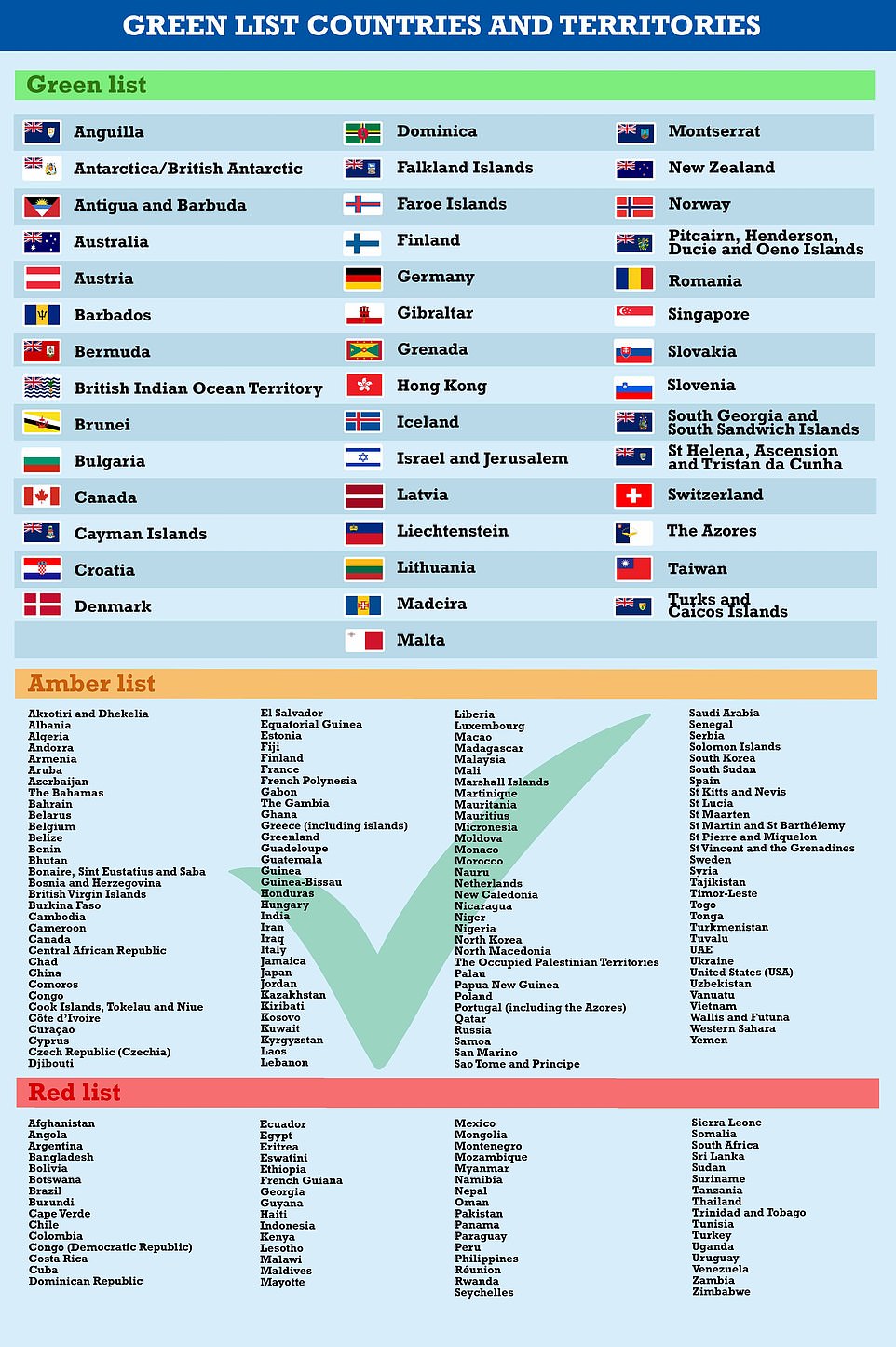
All current ‘amber list’ countries will effectively become green – or ‘go’ destinations –while the number of ‘red list’, or ‘no-go’ countries, will be slashed in half. This means popular holiday destinations such as Turkey are likely to open up to fully jabbed Britons next month
Flexible hours from first day for new employees?
Employees will be given the legal right to request flexible working from their first day in a new job under government plans.
At the moment, new staff must wait 26 weeks before applying to work from home or have flexible start and finish times. But in a potential shake-up the Government is consulting on whether they can request flexible working on day one.
At the 2019 general election, the Tories said they would ‘encourage flexible working’, and working from home became the norm for many during the pandemic. Flexible working can make jobs more accessible to under-represented groups and allow access to a wider talent pool.
A Whitehall source said: ‘This won’t just be about working from home – flexible working is about so much more, from staggered start times and job-sharing, to flexitime and phased retirement.’
Advertisement
The shake-up means that the amber list is officially dead, with those countries joining ‘green’ nations in the new ‘rest of the world’ category.
The Board of Airline Representatives in the UK also welcomed the changes, with chief executive Dale Keller saying: ‘Greater freedom of movement for many vaccinated passengers, without the anxiety of pre-departure tests and the high cost of PCR testing on arrival, will help restore traveller confidence and set the aviation, travel and tourism sectors on what is still a long road to recovery.’
Mr Keller said moving to a binary system and creating a ‘two-tier entry regime’ based on vaccination status will help bring ‘greater clarity to entry requirements’.
He said the announcement is a ‘step towards properly rebalancing international travel risk’ in the UK but warned the existing rules had ‘decimated’ passenger numbers which means firms must now try to ‘claw back lost ground’.
British Airways chief executive and chairman Sean Doyle urged the Government to go further and sweep away all testing requirements for fully-vaccinated travellers.
Huw Merriman, the Tory chairman of the Transport Select Committee, also welcomed the overhaul of the ‘cumbersome’ existing rules.
‘The need for caution is clear but with 80 per cent of our country now vaccinated, UK travel needs a shot in the arm and this could be it,’ he said.
‘It’s a relief to see the Government move on these issues and this announcement, timed ahead of October half-term, could have an immediate impact on the UK’s travel industry.’
Mr Shapps said the new system was ‘proportionate’ and ‘reflects the new landscape’ of the numbers of those who are fully-vaccinated.
Health Secretary Sajid Javid said: ‘Today we have simplified the travel rules to make them easier to understand and follow, opening up tourism and reducing the costs to go abroad.
‘As global vaccination efforts continue to accelerate and more people gain protection from this dreadful disease, it is right that our rules and regulations keep pace.’
Fury as minister says new variant could see England plunged into a ‘full lockdown
England will be plunged back into a ‘full lockdown’ if a vaccine resistant variant of Covid-19 enters the country, a Cabinet minister warned yesterday.
Environment Secretary George Eustice insisted that importing a variant that the jab has no effect on was a bigger threat to the travel sector than coronavirus controls.
In an interview with Sky News yesterday, Mr Eustice said: ‘It has been a very, very difficult time for the travel industry – we absolutely recognise that and that’s why we’ve done all we can to have those easements in place and reduce the restrictions as quickly as we can.
‘But arguably the biggest threat to the travel industry is that we do get another variant that manages to get around the vaccine, that the vaccine can’t deal with, and then we’re into another full lockdown.
‘That’s not what we want and that is why we’ve taken this cautiously, step by step, because we want each step that we take to be irreversible.’
Mr Eustice’s comments sparked anger among Conservative MPs.
Boris Johnson repeatedly said he wanted the UK’s exit from the last lockdown to be ‘irreversible’.
Former party leader Sir Iain Duncan Smith said: ‘There is no way this economy can afford to shut down.
‘If we shut down one more time then we are absolutely going down the plughole.
‘And if ministers think that this is even on the cards, then it is time they checked out.’
David Davis said ministers would likely struggle to get another lockdown through the Commons.
‘Talking about it is one thing but if they did it, there would be a demand that they should justify it,’ he said.
Advertisement
The Department for Transport confirmed the eight countries coming off the red list as of 4am on Wednesday are Turkey, Pakistan, the Maldives, Egypt, Sri Lanka, Oman, Bangladesh and Kenya.
British Airways chief executive and chairman Sean Doyle welcomed the changes but urged ministers to go further.
He said: ‘We welcome the simplification of the traffic light system, and the changes to the testing requirements allowing UK travellers to benefit from our world-leading vaccination programme and finally giving customers and business the confidence to book the journeys they’ve been waiting for.
‘Based on the scientific evidence, with fewer than one per cent of people returning from low-risk countries testing positive for Covid (lower than the UK’s rate), we urge ministers to keep this policy under review, eliminating all testing for fully vaccinated travellers as soon as possible in the future, in line with most other European countries.’
Stewart Wingate, chief executive of Gatwick Airport, said the changes were a ‘significant and welcome step towards recovery’ and a boost for travellers seeking to get away this winter.
He said: ‘Fully vaccinated passengers now have a larger choice of destinations and can book with more confidence in the months before Christmas and beyond – free from the need to arrange pre-departure tests before coming back into the UK.’
Johan Lundgren, chief executive of easyJet, said: ‘This is a welcome step forward for our customers and a move that will make it significantly easier for the fully vaccinated to travel to Europe, opening up flying again for many more UK consumers.
‘Removing the pre-departure test coupled with the disbanding of the traffic light system will inject some much needed confidence into travel once again.
‘However, vaccinated travellers and those from low-risk countries will still have to do an unnecessary test after arriving in the UK, making travel less affordable for all.’
Karen Dee, Airport Operators Association chief executive, said: ‘The easing of travel restrictions is a good step forward. By reducing complexity and the cost of testing, this should encourage more people to travel this winter and allow airports to see a further uplift in passenger numbers.
‘However, this last formal checkpoint of the Global Travel Taskforce should have been the time to return to restriction-free travel at a time when nearly all of the population has been vaccinated. Instead, we continue to have a more onerous approach to travel than our European competitors.’
Virgin Atlantic chief executive Shai Weiss added that Boris Johnson should go further by negotiating the removal of transatlantic restrictions for UK citizens travelling to the US.
He said: ‘We urge the UK Government to use the Prime Minister’s upcoming visit to the USA to work with the Biden administration to remove transatlantic restrictions for UK citizens, just as the UK has done for US travellers, helping loved ones to reunite safely and businesses to restore ties with our largest trading partner.’
Thomas Cook chief executive Alan French said October half-term bookings were up 200 per cent compared to August and he expects this figure to rise as a result of the simpler system.
He said: ‘The news today is a shot in the arm for both the travel industry and families up and down the country who are crying out for some much-needed late summer sun.

The Government has also slashed the number of countries on the red list, with eight nations being removed from 4am on September 22, including Turkey, Pakistan and the Maldives. Above: Passengers at Heathrow
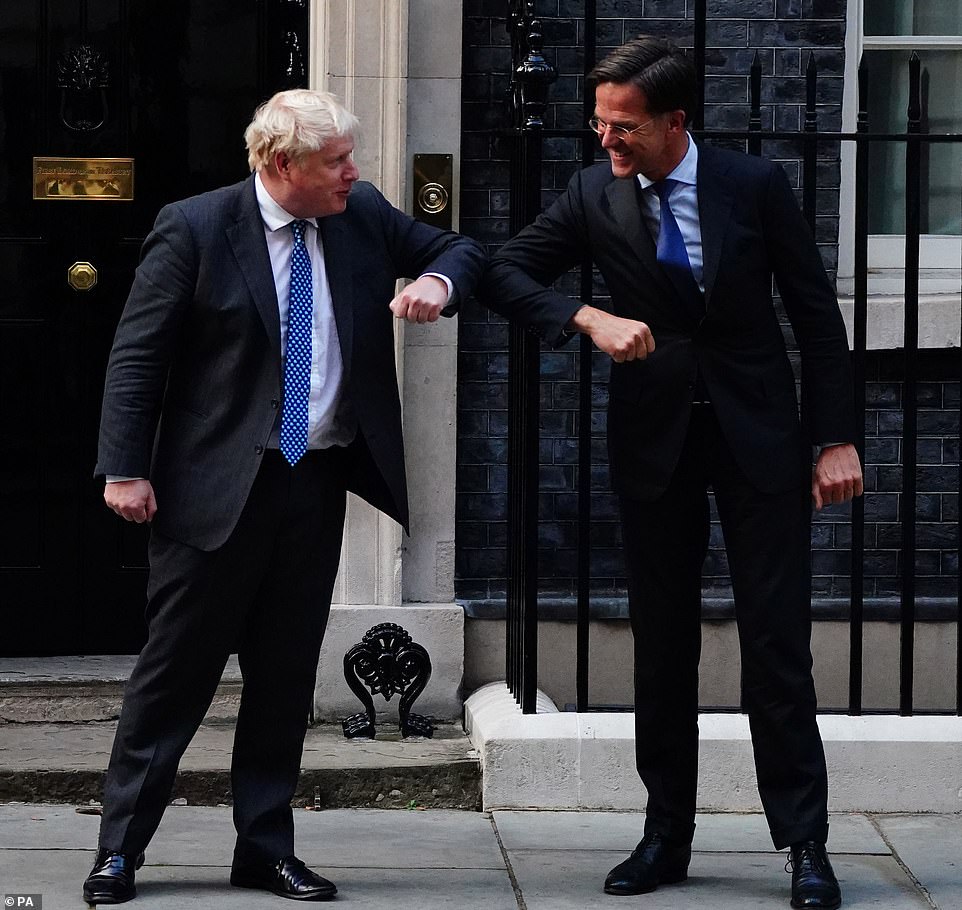
Prime Minister Boris Johnson greets Prime Minister of the Netherlands Mark Rutte, outside 10 Downing Street ahead of a bilateral meeting on Friday

Airline bosses have said Boris Johnson should go further than the newly-announced changes by negotiating the removal of transatlantic restrictions for UK citizens travelling to the US

Today’s changes could also see the number of red-list countries slashed to fewer than 30. Cape Verde, Egypt, the Maldives and Turkey (pictured) are among the holiday destinations currently on the red list
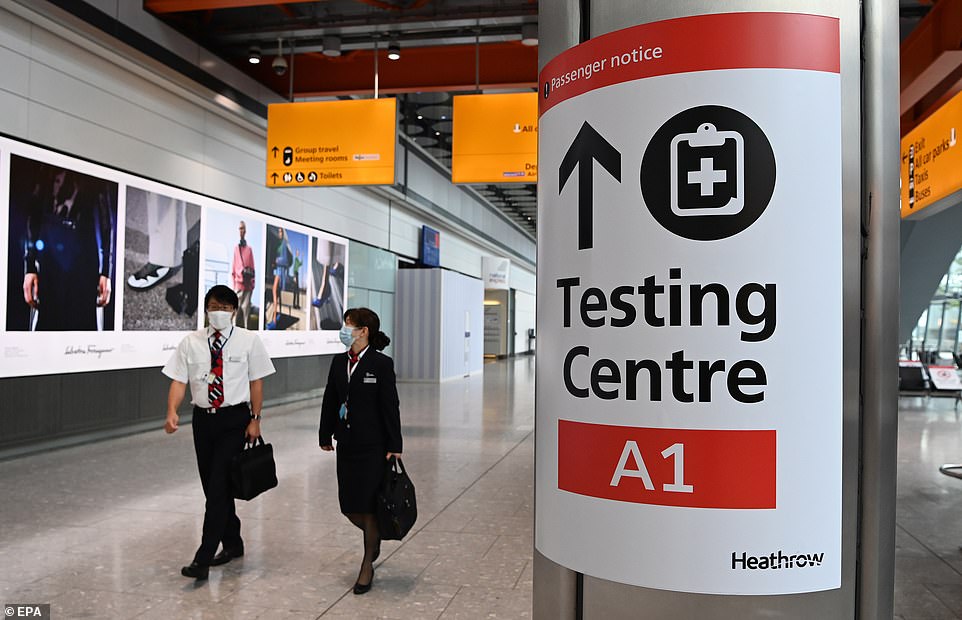
Many countries in Europe have seen their travel industries recover much quicker than the UK’s, having already dropped PCR testing rules for double-jabbed arrivals from low-risk countries
‘Based on our bookings already today, I would expect this weekend to be the biggest of the year so far as people take advantage of the great deals on offer, the new easier rules on testing and the simplified system for international travel.’
Red list booking surge: Holiday sites see increase in demand for trips to Maldives, Mexico and Sri Lanka
Demand for travel to ‘red list’ countries such as the Maldives, Mexico and Sri Lanka is surging amid hopes they could be among the next destinations downgraded in the UK Government’s next travel shake-up.
Travel experts anticipate a ‘large increase in bookings this weekend’ for foreign trips if the Government goes ahead with tearing up testing rules for the fully vaccinated in time for the half-term holidays.
Under a major raft of changes to be announced today, the double-jabbed will no longer have to take costly PCR tests when they return from abroad – and will instead only need a cheaper lateral flow test.
The ‘pre-departure tests’ that travellers are forced to take before flying home are also likely to be scrapped amid a long-awaited review of the travel restrictions that will also see the controversial traffic light rules radically redrawn.
Expedia said today that Mexico is the most popular red list country when comparing this month with September 2020, with a rise in interest of 70 per cent, while the Maldives is up 30 per cent and Sri Lanka 20 per cent.
And Paul Charles, chief executive of travel consultancy The PC Agency, told MailOnline this morning: ‘I think you’ll see a large increase in bookings this weekend, if the Prime Minister goes ahead with the measures.’
Skyscanner said it had seen a 92 per cent increase in the last full week for return searches by UK travellers with Dubai, ‘everywhere’, Alicante, Malaga and Dublin in the top spots, while interest in Turkey has also seen an uptick.
TravelSuperMarket added that average holiday prices to Spain for this month and next are 38 per cent down on the same period in 2019 given that it remains on the amber list, but green list Malta is up 29 per cent.
Advertisement
Managing director of TUI UK Andrew Flintham said he has already seen ‘an uptick in bookings for Turkey in October’ and expects customer confidence to have been boosted further by the new rules.
He added though that ‘fully vaccinated customers (in the UK) still have more travel restrictions in place than many other countries around the world, so as an industry we will not see the return of operations as we would like’.
Many countries in Europe have seen their travel industries recover much quickly than the UK’s, having already dropped PCR testing rules for double-jabbed arrivals from low-risk countries.
There has also been huge controversy over the Government’s approved list of PCR testing providers, with a litany of complaints that the tests are too expensive, and a disincentive to foreign travel.
Although the travel ‘red list’ of countries deemed to pose a high risk from new Covid variants will remain in place, the number of countries will be reduced by more than half from the current 62, opening up the vast majority of destinations to those who are fully jabbed.
However, the unvaccinated face an even tougher regime from today.
At present, unvaccinated travellers returning from green list countries such as Croatia, Denmark and Germany have to take a PCR test within two days of their arrival home.
Under the new system they will have to isolate at home for ten days and take PCR tests on both day two and day eight, as they currently do for amber list countries.
The changes will be in place in time for the October half-term.
This evening a government source said the shake-up reflected growing confidence in the effectiveness of the Covid vaccines, coupled with a desire to cut travellers’ costs.
There will be widespread relief at the scrapping of the traffic light system. Since its launch in May, travellers have been subjected to a series of confusing and last-minute announcements.
Today’s changes could also see the number of red-list countries slashed to fewer than 30. Cape Verde, Egypt, the Maldives and Turkey are among the holiday destinations currently on the red list.
Airlines UK’s Mr Alderslade said: ‘Getting rid of PCR testing would be a real step forward but not if we still end up with two tests you have to pay for. We need to follow Europe’s example and remove these requirements if you’ve been vaccinated.’
Charlie Cornish, chief executive of the Manchester Airports Group, said: ‘People should be free to travel again to low-risk destinations without having to take any tests – whether that is PCR or lateral flow. The time for baby steps is over.’
Travel expert Paul Charles, chief executive of travel consultancy The PC Agency, said earlier this week that 24 countries ‘should be taken off’, including Pakistan, South Africa, the Dominican Republic, Argentina and Chile.
He added that he would be ‘very surprised’ if Turkey is removed due to ‘worsening’ coronavirus data. But coronavirus data analyst Tim White said: ‘With Grant Shapps and the travel lottery, no-one can be sure.
Scotland will NOT remove pre-departure test requirement
Scotland will not follow England in removing the requirement for people who are fully vaccinated to take a pre-departure test before returning from non-red list destinations.
In a statement, the Scottish Government said: ‘A UK Government decision to implement proposals to remove the requirement for a pre-departure test in England and to use lateral flow tests on day two have not been adopted at this stage in Scotland due to significant concerns at the impact on public health.’
Transport Secretary Michael Matheson said the Scottish Government ‘has concerns that the UK Government’s proposals to remove the requirement for a pre-departure test for some travellers will weaken our ability to protect the public health of Scotland’s communities’.
He added: ‘While we want to maintain a four-nations approach to these matters, we need to consider urgently their implications.’
Advertisement
‘But the data firmly support Turkey being removed as it has no threat of variants and a lot of genomic sequencing.’
However in a big boost to millions of Britons hoping to catch some late season sun, it was today reported that Turkey will be removed from the Government’s red list in time for the school half-term holidays.
According to the Times, the red list will be more than halved, with Turkey one of the countries set to be removed from the list.
The country is one of the UK’s most popular destinations for late autumn/winter sun – with average highs of around 26C.
More than two million Britons holidayed in the country in 2019, Officer for National Statistics figures show. But the country has been on the red list since May.
Meanwhile, Jamaica, which is currently on the amber list, is one of the countries which could find itself moved up rather than down when changes are announced today, experts warn.
The island’s seven-day average for Covid cases has been on the rise since July, peaking at 769 cases at the end of August.
Yesterday Jamaica – a country of around 3 million people – recorded 510 new cases with a seven day average of 572.
Jamaica remained amber in the last traffic lights update, but the Foreign Office has since changed its guidance for the country and advises ‘against all but essential travel to the whole of Jamaica based on the current assessment of COVID-19 risks’.
The Caribbean island of Grenada, which is currently on the green list, is also at risk of being move on to the red list, according to data expert Tim White.

Jamaica, which is currently on the amber list, is one of the countries which could find itself moved up rather than down when changes are announced today, experts warn. Pictured: Montego Bay in Jamaica

The Caribbean island of Grenada (pictured: St George’s Grenada) , which is currently on the green list, is also at risk of being move on to the red list, according to data expert Tim White. Covid figures have spiked since the start of September, with the country’s seven day average rising from 39 cases on September 1 to 164 in a fortnight
Covid figures have spiked since the start of September, with the country’s seven day average rising from 39 cases on September 1 to 164 in a fortnight.
Serbia, Kosovo and Albania, according to data expert Tim White. Mr White told Sky News that Nigeria could also be vulnerable.
The travel sector has been desperate for the testing and quarantine rules for international travel to be relaxed.
Heathrow said this week it had gone from being Europe’s busiest airport in 2019 to number 10 on the list, behind rivals in cities such as Amsterdam, Paris and Frankfurt.
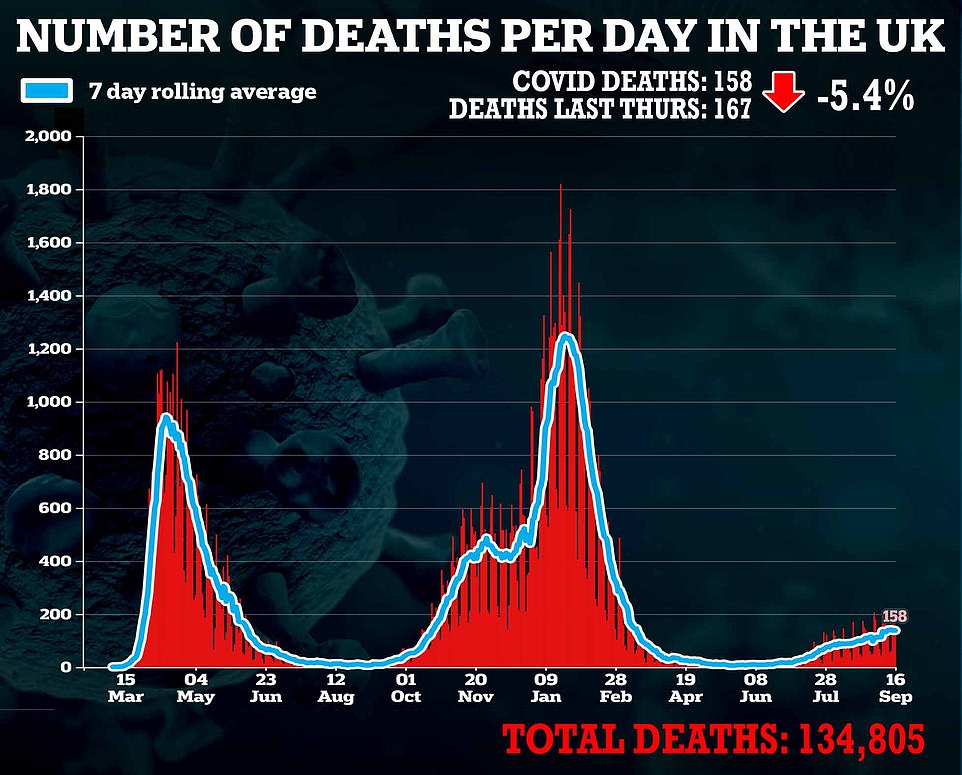
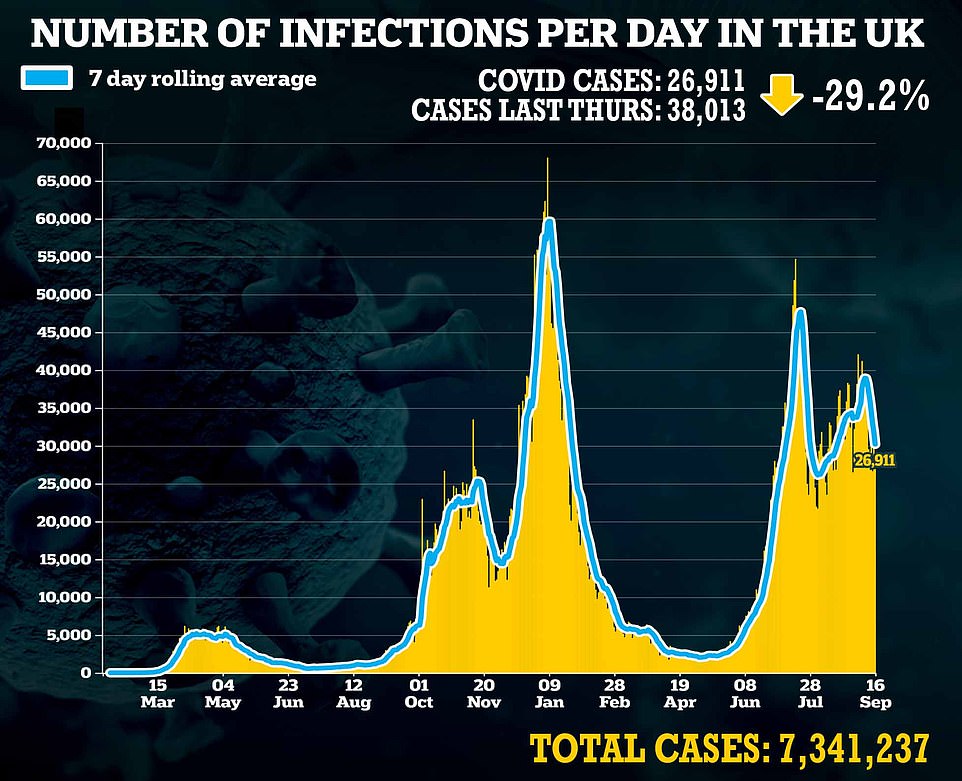
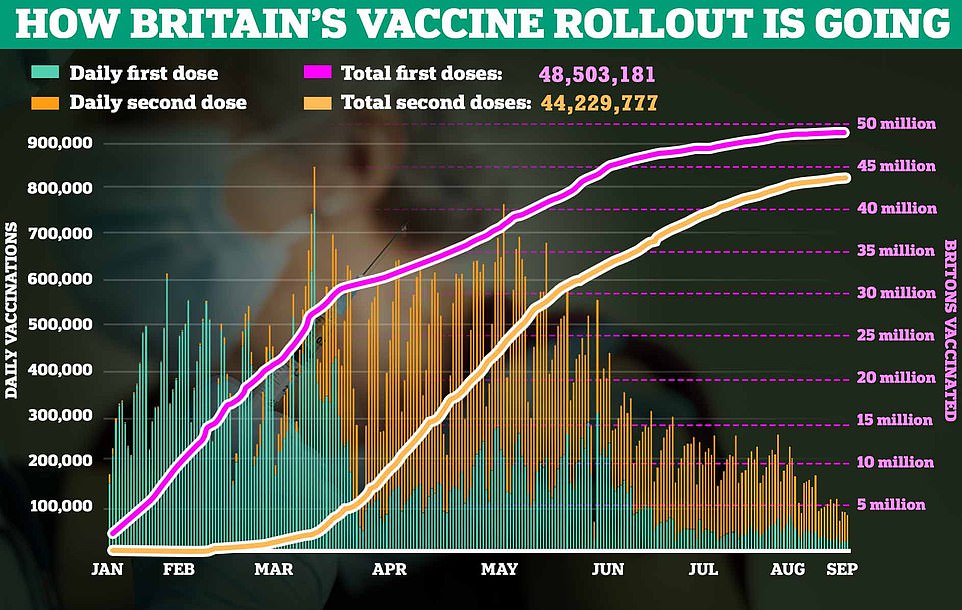
After all those gloomy claims, infections dip
By Victoria Allen, Science Correspondent
Infection levels in England have fallen slightly in the wake of gloomy warnings over cases.
About one in 80 people had Covid in the week to September 11, which was down from one in 70 the previous week, according to the Office for National Statistics.
The highest rates were seen in secondary school pupils, suggesting the return to school is causing the virus to spread.
About one in 25 of those aged 11 to 16 tested positive.
But just 0.7 per cent of over-70s were estimated to have the virus in the latest survey results.
A rate of one in 80 means about 700,000 have the virus in England. The figures exclude hospitals and care homes.
In Scotland, one in 45 people had Covid in the week to September 11, according to the ONS.
It is the second week in a row that the rate has been at its highest level since Scottish estimates began in October last year.
Professor James Naismith, from the University of Oxford, said the numbers tell a ‘mixed story’, adding: ‘Scotland is not well placed for the oncoming winter…
‘I think it is very important to figure out quite quickly why Scotland is in such difficulty.’
In Wales, around one in 60 are estimated to have had Covid in the week to September 11, up from one in 65 in the previous week.
In Northern Ireland, the latest estimate is one in 75, down from one in 60.
Yesterday, 32,651 cases and 178 deaths were recorded in the UK.
On Tuesday, Boris Johnson unveiled his Winter Plan for Covid as officials warned the disease remains a risk.
Advertisement
The transport hub announced it recorded a 48 per cent increase in passenger numbers in August compared with the previous month.
Some 2.2million passengers travelled through the west London airport last month, up from 1.5 million in July and the highest monthly passenger total of the coronavirus pandemic.
However, the airport noted that demand was still down 71 per cent compared with before the coronavirus crisis. In August 2019, passenger numbers reached 7.7 million.
Heathrow has urged the Government to ‘streamline’ the rules for international travel, calling for the amber list to be scrapped, and a two-tier system introduced.
Under the airport’s proposals, fully vaccinated arrivals from green list locations would no longer be required to take a test, whereas those who are not fully vaccinated would need to take lateral flow tests pre-departure and post-arrival.
Only those who test positive would need to take a more expensive PCR test. Hotel quarantine would be retained for arrivals from high-risk red list countries.
Heathrow chief executive John Holland-Kaye said: ‘The Government has the tools to protect the UK’s international competitiveness which will boost the economic recovery and achieve its ‘global Britain’ ambitions.
‘If ministers fail to take this opportunity to streamline the travel rules then the UK will fall further behind as trade and tourists will increasingly bypass the UK.’
Meanwhile Gary Wilson, the chief executive of easyJet Holidays, earlier this week said Britain was lagging behind the rest of Europe in terms of travel.
For example, Germany, which has low case rates, has a red list but no countries currently appear on it.
Mr Wilson told a Travel Weekly conference that the company was ‘back to pre-pandemic levels’ in Europe. He urged ministers to adopt a less restrictive approach to holidays.
He said: ‘The government throwing us scraps and expecting us to be grateful for that isn’t good enough.
‘They may continue not to listen but it shows the disconnect between the government and the industry.’
Meanwhile, Steve Heapy, the chief executive of Jet2, the UK’s second biggest tour operator, said of the system: ‘It’s impossible for customers to plan.
Winter is very popular with city breaks and short breaks, [but] people are just not going to risk it for two or three days as long as this complexity remains.’
By
Source link : https://www.dailymail.co.uk/news/article-10002881/Holiday-bookings-soar-ministers-axe-traffic-light-single-red-list.html












